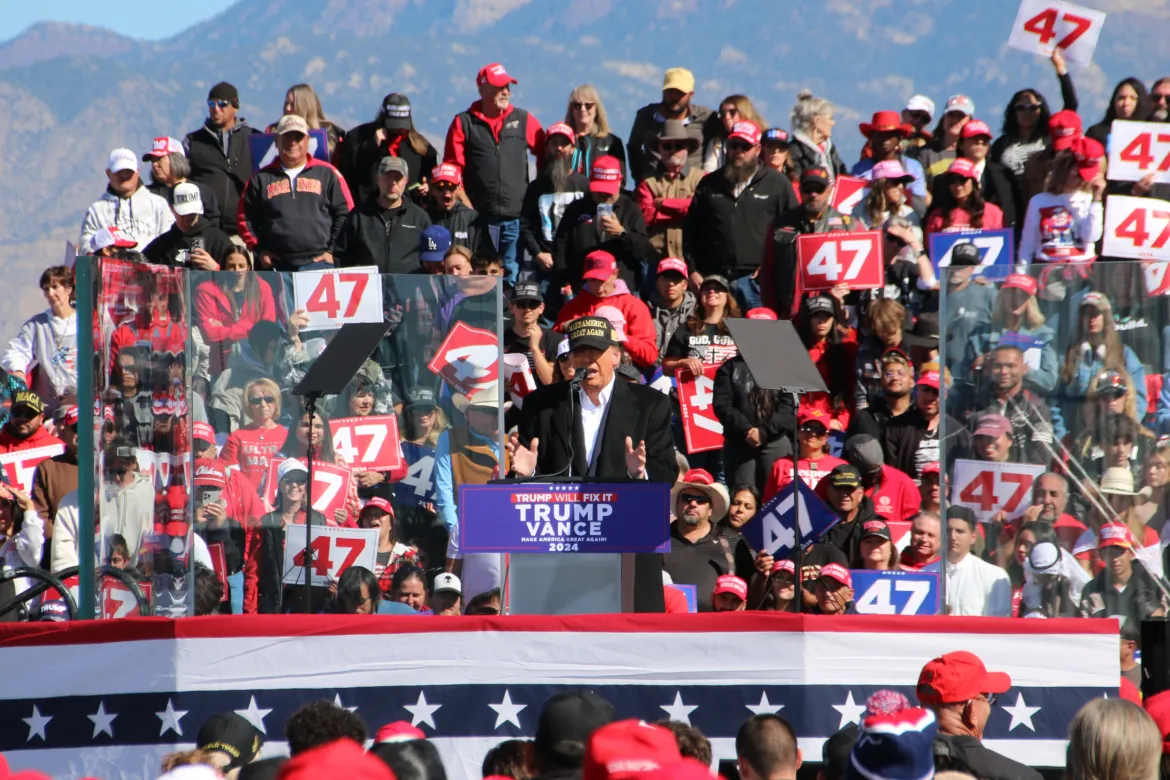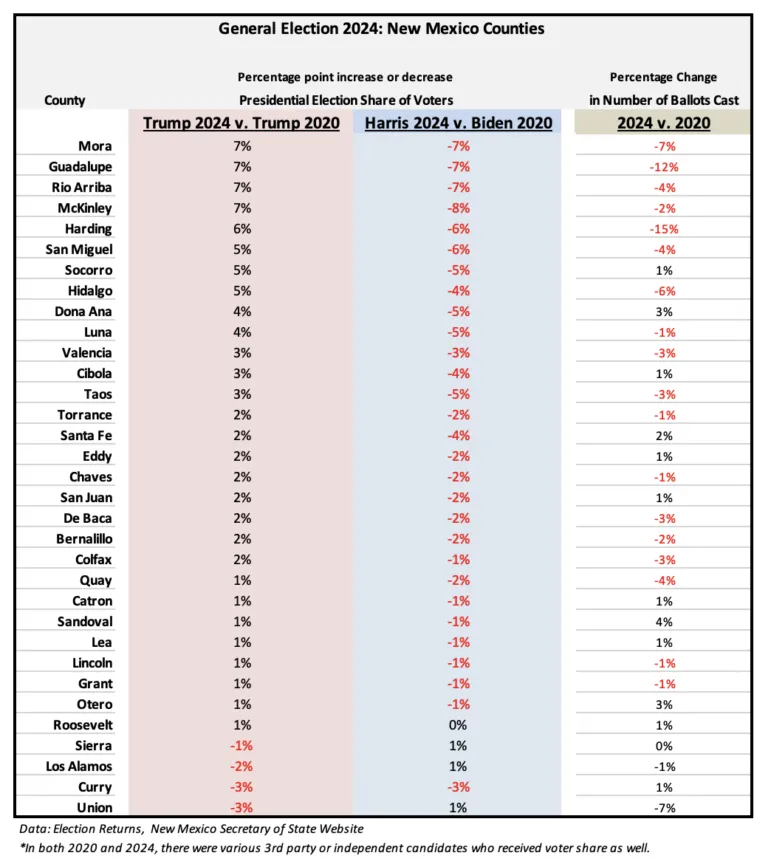‘Enthusiasm gap’ benefited Trump in New Mexico
Trump made some of his largest gains in New Mexico's northern and western Democratic strongholds.


Marjorie Childress, Bella Davis, and Trip Jennings, New Mexico In Depth
This story was originally published by New Mexico In Depth.
Since the November 6 election, a debate has played out nationally about the degree to which Donald Trump won a mandate to enact his plans to deport millions of immigrants, drastically reduce the federal budget, and eliminate his predecessor’s climate initiatives.
It’s a debate in New Mexico too.
Voters once again embraced Democrats — long the dominant party — who carried every federal race. Sen. Martin Heinrich beat his Republican challenger, Nella Domenici, by 10 percentage points. Second Congressional District’s Gabe Vasquez, who most thought would be in a tight race, won by four points, much larger than 2022. A number of Democratic candidates for the New Mexico Legislature handily won races predicted to be close, and candidates who won their primary races will make the statehouse more progressive.
And yet Vice President Kamala Harris carried the state by a slimmer margin than Democrats in either 2016 or 2020, winning by six points, down from 11 in 2020 and eight in 2016.
Trump made some of his largest gains in northern and western Democratic strongholds.
But a deeper dive into the data, and conversations with 19 New Mexicans who are in the business of thinking deeply about politics and elections — political scientists and election analysts, party and grassroots activists, and legislative leaders — suggest that rather than a shift to the right, at least at the top of the ticket, a swath of New Mexicans simply decided to sit the election out, many of them in Democratic dominant counties. Meanwhile, voters in Republican strongholds were more motivated to turn out.
Combine that with the sour mood of many Americans who are paying much more for food and housing than they were four years ago and it all accrued to Trump’s benefit, the thinking goes.
There was an “enthusiasm gap” for Harris, an argument made repeatedly by different people to make sense of the fact that a lower number of Democrats voted in 2024.
“We can’t ignore the fact that we simply have fewer Democrats who’ve participated in the election in 2024, than 2020, and more Republicans. And then you have to ask, why is that? Was there an enthusiasm gap?” said Brian Sanderoff, a respected New Mexico political analyst and pollster.
Preliminary data obtained from the Secretary of State’s office with election results broken down by party as of election day, shows 25,000 fewer Democrats voted in 2024 than in 2020. But the number of Republican voters rose by 9,000, and independent voters — “declined to state” in registration lingo — beat 2020’s turnout by 14,000. (These numbers may change once election results are certified).
Despite more people who are eligible to vote this year, about the same number of ballots were cast in 2020 and 2024.
But this year, where those ballots were cast appears to tell a story of how motivated voters were in the two parties.
In a number of counties considered Republican strongholds, more ballots were cast than in 2020. But in notable Democratic strongholds, fewer ballots were cast — Rio Arriba, San Miguel, Mora, Taos, McKinley, and the state population center, Bernalillo County, too.
Meanwhile, Trump increased his share of votes, in particular, in Rio Arriba, San Miguel, Mora, and McKinley — some of the most staunchly Democratic counties in the state.

“Democrats just did not show up,” said Michael Rocca, a political scientist at the University of New Mexico who studies American elections and politics. “…There was a major enthusiasm gap.”
Meanwhile, Steve Pearce, chairman of the Republican Party of New Mexico, offered insight into the GOP’s better turnout. In addition to pushing Republicans to vote early and to use same-day registration, the party played to people’s fears of a diminished oil and gas industry should Harris win the presidency.
“We concentrated messaging” in areas where Republicans typically do well, including in regions where oil and gas is dominant, that “the future of the oil and gas industry depends
on who’s president because the governor is trying to get rid of it,” Pearce said. He was speaking of Democratic Gov. Michelle Lujan Grisham’s push for New Mexico to adopt cleaner energy sources in coming decades.
“People got the message and said, ‘Okay, not only are we fighting high prices,’ we may not even have a job in the future,’” Pearce said.
For Rocca, the 2024 election will be remembered in large part for the Democratic Party changing its nominee with just months to go before polls opened.
“It’s really hard for me, as somebody who studies presidential elections and campaigns, to be convinced by anybody that that did not play a role,” he said. “I mean, it just crushes the Democratic Party’s momentum going into the general election.”
The compressed timeline of her candidacy didn’t help Harris, said Gabriel Sanchez, director of the University of New Mexico Center for Social Policy. The vice president stepped in as the Democratic nominee after President Joe Biden withdrew from the race in late July, giving her a little over 100 days to campaign. Some voters felt they didn’t know enough about her, Sanchez said.
But Carter Bundy, longtime political staff for AFSCME, a public employees labor union, who now has his own consulting business, Adelia Advocacy, is less convinced that the late candidate switch was a major issue for Democrats. Biden — who had a 36% approval rating in July, according to a Gallup poll — would have done much worse than Harris, he said, had he stayed on the ballot. “Clearly, she was able to separate herself from him,” he said of Harris.
Bundy said economic issues were at the forefront for voters. The pandemic was hard, he said, and “what Biden and Harris really didn’t do well, was just level with the American people to say, ‘You know what, it’s going to be tough for a while, but we’re doing better than anybody else.’”
Former Republican state senator and longtime political strategist Rod Adair agreed: Prices have risen significantly over the past five years while most people’s pay hasn’t kept pace. So even if inflation is significantly down from the high of 8% in the months after the economy reopened after the pandemic, prices are higher while inflation is creeping up at 2% a year. “The Democrats kept trying to tell people, ‘Oh, no, inflation has ended,’ and people are still looking at the products that they have to buy.”
Andrea Serrano, executive director of OLÉ, a progressive, local nonprofit, shared similar thoughts. Part of what explains Trump’s gains is poor messaging from the Democratic Party, she said. The Biden administration has improved the economy by some measures, including employment growth, but that wasn’t effectively communicated to voters, Serrano said.
And among national Democratic consultants, she said, “the calculus has been since 2016 that we need to win back white working class voters while taking Black and Latino working class voters for granted.”
In the 2024 American Electorate Voter Poll, which was sponsored by progressive organizations and released earlier this month, 45% of Latinos nationally said they hadn’t been contacted this year by a political party or other organization asking them to vote. Compared to prior elections, that’s a low level of outreach, said Sanchez, who’s also the director of research at Barreto-Segura Partners Research, one of the groups that conducted the survey.
The gap between Latinos who said they’d been contacted by someone from the Democratic Party compared to the Republican Party was also narrower than Sanchez has seen in prior election cycles.
Sanchez attributes the jump in Trump voters in New Mexico partly to increased support for the president-elect among Hispanic voters, particularly Hispanic men, driven by concerns over cost of living, jobs and the economy. Latinos who responded to the survey published last week identified those as the issues most important to them.
“Democrats just never really provided a strong reason for a lot of these moderate Democrats that were kind of open to thinking about a Republican candidate, never really persuaded them that they had a good plan and would prioritize the economy,” Sanchez said.
Austin Weahkee, governance program director for the New Mexico Working Families Party, a progressive organization that works during elections to get out the vote, said the Democratic Party failed to connect with working people.
“There was a lot of talk about how this is the best economy in recent history, but there’s a pretty vast difference between talking about where stock numbers are at, how the overall market is doing, versus how much groceries cost,” he said.
House Speaker Javier Martínez, a Democrat from Albuquerque, added that the Democrats’ central message, saving democracy and its institutions, didn’t meet many Hispanics where they live day in, day out.
“The National Democrats were talking about safeguarding our institutions,” Martínez said. “Well, guess what? These institutions, in many cases, have not worked for us, right? Our kids have dropped out of high school, right? We have relatives in prison. The criminal justice system doesn’t seem to work for many in our community. Yet, that was the main message. So I do wonder, national Democrats, who are they speaking to?”
Merritt Hamilton Allen lay some of the blame at the feet of the media.
“The media failed to define inflation very well,” said Allen, whose education was in economics and who has run for elected office in New Mexico. Allen describes herself as a Reaganite Republican “which in 2024 means I’m an independent.”
“The prices are never going back to what they were,” she said. “If you have negative inflation, your economy is in much, much worse shape than it is. So people have this expectation that is completely inappropriate.”
New Mexico Senate President Pro Tem Mimi Stewart, an Albuquerque Democrat, was more frank in her assessment of how the media performed.
The media wasn’t interested in Biden’s accomplishments, she said. Instead, they “normalized” Trump even while he “has been lying for years.” Meanwhile, she said, voters were inundated with “horrible ads about trans kids.”
Weahkee worries that one of the Democratic Party’s takeaways will be that it needs to move to the right on multiple issues, including backing away from support for transgender people and undocumented immigrants.
“People will have to get used to it, because they are not going anywhere. They are valued members of the community,” he said. “Electing a far-right candidate like this isn’t going to make them go anywhere. It’s going to make their lives a lot more difficult, but they’re still going to be around in a few years. So political courage is really important as we get through this, and as we talk about a rightward shift, we need to make sure that our leaders are not taking that to mean we need to moderate ourselves.”



